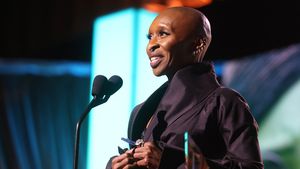CONTACTStaffCAREER OPPORTUNITIESADVERTISE WITH USPRIVACY POLICYPRIVACY PREFERENCESTERMS OF USELEGAL NOTICE
© 2024 Pride Publishing Inc.
All Rights reserved
All Rights reserved
By continuing to use our site, you agree to our Private Policy and Terms of Use.
Americans are living longer than ever, but not as long as people in 41 other countries.
For decades, the United States has been slipping in international rankings of life expectancy, as other countries improve health care, nutrition, and lifestyles.
Countries that surpass the U.S. include Japan and most of Europe as well as Jordan and the Cayman Islands.
''Something's wrong here when one of the richest countries in the world, the one that spends the most on health care, is not able to keep up with other countries,'' said Christopher Murray, head of the Institute for Health Metrics and Evaluation at the University of Washington.
A baby born in the United States in 2004 will live an average of 77.9 years. That life expectancy ranks 42nd, down from 11th two decades earlier, according to international numbers provided by the Census Bureau and domestic numbers from the National Center for Health Statistics.
Andorra, a tiny country in the Pyrenees mountains between France and Spain, had the longest life expectancy, at 83.5 years, according to the Census Bureau. It was followed by Japan, Macau, San Marino, and Singapore.
The shortest life expectancies were clustered in sub-Saharan Africa, a region that has been hit hard by AIDS as well as famine and civil strife. Swaziland has the shortest, at 34.1 years, followed by Zambia, Angola, Liberia, and Zimbabwe.
Researchers said several factors have contributed to the United States falling behind other industrialized nations. A major one is that 45 million Americans lack health insurance, while Canada and many European countries have universal health care, they say.
But ''it's not as simple as saying we don't have national health insurance,'' said Sam Harper, an epidemiologist at McGill University in Montreal. ''It's not that easy.''
Among the other factors:
-Adults in the United States have one of the highest obesity rates in the world. Nearly one third of U.S. adults 20 years and older are obese, while about two thirds are overweight, according to the National Center for Health Statistics.
''The U.S. has the resources that allow people to get fat and lazy,'' said Paul Terry, an assistant professor of epidemiology at Emory University in Atlanta. ''We have the luxury of choosing a bad lifestyle as opposed to having one imposed on us by hard times.''
-Racial disparities. Black Americans have an average life expectancy of 73.3 years, five years shorter than white Americans.
Black American men have a life expectancy of 69.8 years, slightly longer than the averages for men in Iran and Syria and slightly shorter than those in Nicaragua and Morocco.
-A relatively high percentage of babies born in the U.S. die before their first birthday, compared with other industrialized nations.
Forty countries, including Cuba, Taiwan and most of Europe had lower infant mortality rates than the U.S. in 2004. The U.S. rate was 6.8 deaths for every 1,000 live births. It was 13.7 for Black Americans, the same as Saudi Arabia.
''It really reflects the social conditions in which African American women grow up and have children,'' said Marie C. McCormick, professor of maternal and child health at the Harvard School of Public Health. ''We haven't done anything to eliminate those disparities.''
Another reason for the U.S. drop in the ranking is that the Census Bureau now tracks life expectancy for a lot more countries (222 in 2004) than it did in the 1980s. However, that does not explain why so many countries entered the rankings with longer life expectancies than the United States.
Murray, from the University of Washington, said improved access to health insurance could increase life expectancy. But, he predicted, the U.S. won't move up in the world rankings as long as the health care debate is limited to insurance.
Policymakers also should focus on ways to reduce cancer, heart disease and lung disease, said Murray. He advocates stepped-up efforts to reduce tobacco use, control blood pressure, reduce cholesterol, and regulate blood sugar.
''Even if we focused only on those four things, we would go along way toward improving health care in the United States,'' Murray said. ''The starting point is the recognition that the U.S. does not have the best health care system. There are still an awful lot of people who think it does.'' (AP)
From our Sponsors
Most Popular
31 Period Films of Lesbians and Bi Women in Love That Will Take You Back
December 09 2024 1:00 PM
18 of the most batsh*t things N.C. Republican governor candidate Mark Robinson has said
October 30 2024 11:06 AM
True
After 20 years, and after tonight, Obama will no longer be the Democrats' top star
August 20 2024 12:28 PM
Trump ally Laura Loomer goes after Lindsey Graham: ‘We all know you’re gay’
September 13 2024 2:28 PM
60 wild photos from Folsom Street East that prove New York City knows how to play
June 21 2024 12:25 PM
Melania Trump cashed six-figure check to speak to gay Republicans at Mar-a-Lago
August 16 2024 5:57 PM
Latest Stories
Cynthia Erivo dazzles the 2024 Out100 event with powerful speech
December 11 2024 11:50 PM
Sheryl Lee Ralph accepts the Advocate of the Year Award at Out100
December 11 2024 11:40 PM
US v Skrmetti is a public health disaster
December 11 2024 6:00 PM
BREAKING: U.S. House passes defense spending bill with anti-trans provision
December 11 2024 5:09 PM
Vatican adds event for LGBTQ+ Catholics to Holy Year calendar
December 11 2024 5:05 PM
U.K. bans puberty blockers for trans youth indefinitely
December 11 2024 3:37 PM
Montana Supreme Court upholds block on gender-affirming care ban
December 11 2024 2:24 PM
Donald Trump's lesbian niece Mary Trump slams him as 'deeply ignorant, cruel man'
December 11 2024 1:27 PM
Trending stories
Recommended Stories for You

















































































